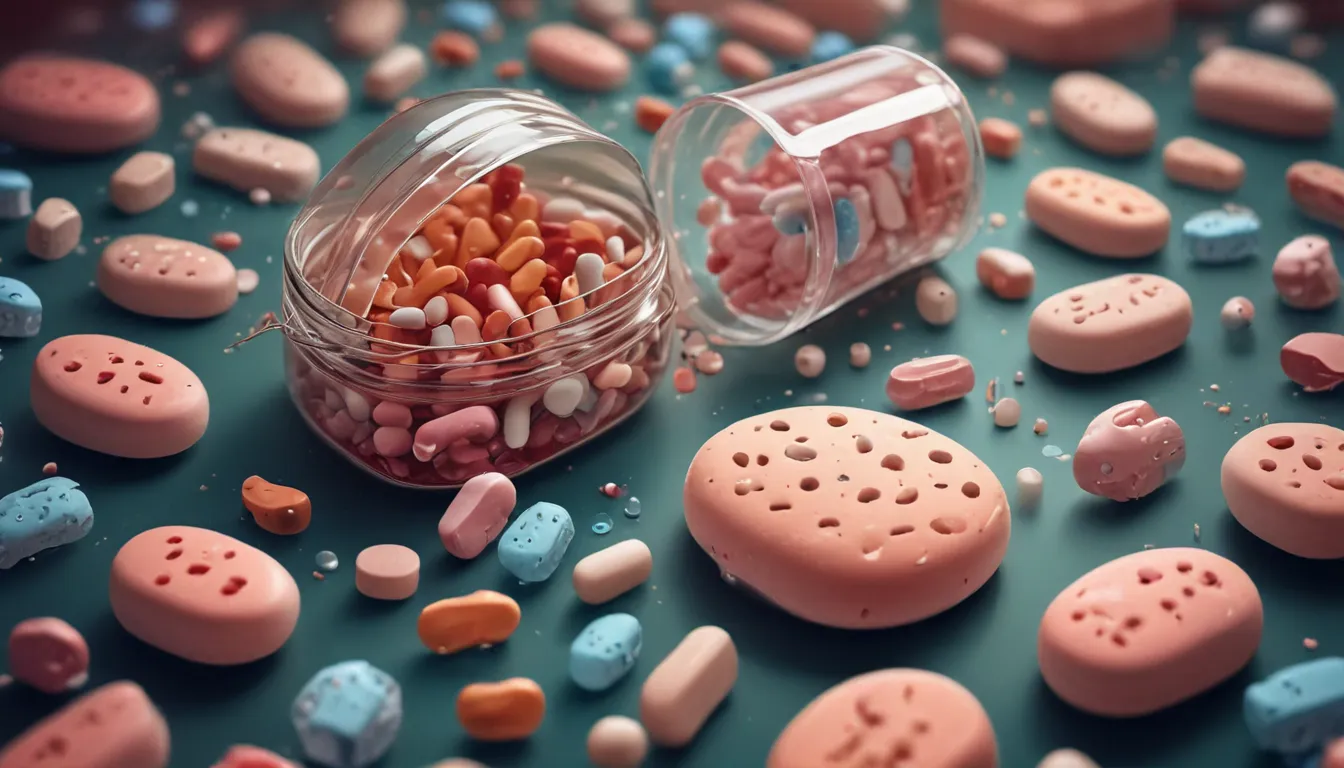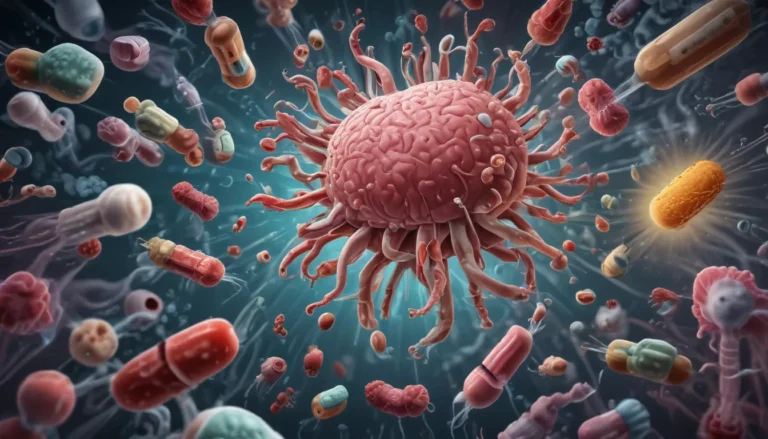A Note About Images: The images used in our articles are for illustration purposes only and may not exactly match the content. They are meant to engage readers, but the text should be relied upon for accurate information.
In the realm of modern medicine, antibiotics stand as a beacon of hope, combating bacterial infections and saving lives. These miraculous medications have transformed healthcare, but how much do we truly understand about them? Delve into the captivating world of antibiotics as we uncover 15 astonishing facts that will educate and surprise you. Whether you are a biology enthusiast or simply intrigued by medical advancements, these facts will unveil the fascinating journey of antibiotics and leave you with a newfound appreciation for their wonders.
Understanding the Power of Antibiotics
- Antibiotics are potent medicines that combat bacterial infections, although they are ineffective against viruses like the common cold. Overuse of antibiotics can lead to resistance, emphasizing the importance of using them judiciously.
- The discovery of antibiotics, exemplified by penicillin, has revolutionized medicine and played a pivotal role in saving countless lives. However, concerns regarding overprescription and the dwindling availability of new antibiotics loom over the horizon.
The Game-Changer: Penicillin’s Legacy
Back in 1928, Alexander Fleming stumbled upon the antibiotic properties of penicillin by accident. This serendipitous discovery paved the way for a myriad of other antibiotics that have since transformed the landscape of medicine.
Antibiotic Resistance: A Looming Threat
Overuse and misuse of antibiotics have spawned the emergence of antibiotic-resistant bacteria, posing a grave global health threat. Everyday infections may become untreatable in the future if steps are not taken to curb this alarming trend.
Unveiling the Side Effects of Antibiotics
While antibiotics are generally safe, they can trigger side effects such as nausea, diarrhea, or allergic reactions in some individuals. Adhering to prescribed dosages and promptly reporting adverse effects is crucial for optimal health outcomes.
The Microbiome Mystery: Antibiotics’ Impact
Antibiotics have the potential to disrupt the delicate balance of the microbiome, comprising trillions of microorganisms in the human body. This disruption can lead to a host of health issues by indiscriminately wiping out beneficial bacteria along with harmful ones.
Diverse Classes of Antibiotics
Antibiotics span various classes, including penicillins, cephalosporins, tetracyclines, macrolides, and fluoroquinolones. Each class targets specific types of bacteria and operates through distinct mechanisms, underscoring the diversity within this realm.
Delving into Natural Sources
Many antibiotics, such as penicillin, trace their origins back to natural sources like fungi or bacteria. These natural compounds have undergone modifications and synthesis to enhance their potency and effectiveness in combating infections.
Navigating Drug Interactions
Certain antibiotics can interact with other medications, necessitating careful consideration to avoid adverse effects. Informing healthcare providers about all medications being taken is crucial to mitigate potential drug interactions.
Beyond Medicine: Antibiotics in Various Industries
Besides medical applications, antibiotics find utility in agriculture for preventing and treating bacterial infections in livestock. They also play a role in the production of consumer goods like cosmetics and cleaning agents, showcasing their versatile applications beyond healthcare.
The Administration Routes of Antibiotics
Antibiotics can be administered orally through pills or liquids, injected into the bloodstream, applied topically on the skin, or delivered intravenously. The choice of administration depends on the type and severity of the infection being treated.
Addressing Overprescription Concerns
The issue of overprescribing antibiotics persists in healthcare settings, contributing to the rise of antibiotic resistance. Prudent use of antibiotics, strictly when necessary and at appropriate dosages, is imperative to combat this challenge effectively.
Safeguarding Potency: Shelf Life of Antibiotics
Antibiotics possess a limited shelf life and may lose efficacy over time. It is essential to adhere to expiration dates and proper storage practices to ensure their potency and effectiveness when needed.
Precision Targeting: Specificity of Antibiotics
Certain antibiotics are tailored to target specific bacterial strains, while others exhibit a broader spectrum of activity. This versatility enables healthcare professionals to customize treatments based on the precise nature of the infection being treated.
Urgency for Novel Antibiotics
The pace of developing new antibiotics has slowed considerably in recent years, creating a scarcity of effective treatments for certain bacterial infections. The quest for innovative antibiotics and alternative strategies remains a pressing necessity in the realm of healthcare.
Embracing Antibiotics: A Lifesaving Marvel
In conclusion, antibiotics have etched a remarkable legacy in modern medicine by saving lives and eradicating bacterial infections. Their historical significance and ongoing impact underscore the vital role they play in safeguarding human health. Responsible antibiotic use is paramount in curbing resistance and preserving the efficacy of these indispensable medications.
Frequently Asked Questions
- How do antibiotics work?
-
Antibiotics target specific components of bacterial cells, disrupting their cell walls, proteins, or genetic material to inhibit growth and ultimately eliminate the bacteria.
-
Are antibiotics effective against viral infections?
-
No, antibiotics only combat bacterial infections and are ineffective against viral illnesses like the common cold or flu.
-
Can antibiotics have side effects?
-
Yes, antibiotics can trigger side effects such as nausea, diarrhea, and allergic reactions. Promptly reporting any adverse effects to healthcare providers is essential.
-
How long should antibiotics be taken?
-
It is vital to complete the full course of antibiotics as prescribed by a healthcare provider, even if symptoms improve before completion to prevent antibiotic resistance.
-
How can antibiotic resistance be prevented?
- To combat antibiotic resistance, only take antibiotics when prescribed, complete the full course as directed, and avoid using leftover antibiotics. Practicing good hygiene is also crucial in reducing infection risks.
Explore the realm of antibiotics with a curious mind, unraveling the complexities and marvels they hold. Through a deeper understanding of antibiotics, we can navigate the challenges of antibiotic resistance and embrace the transformative power of these life-saving medications. Join us in this enlightening journey through the fascinating world of antibiotics, where education and awareness lead the way to healthier tomorrows.






